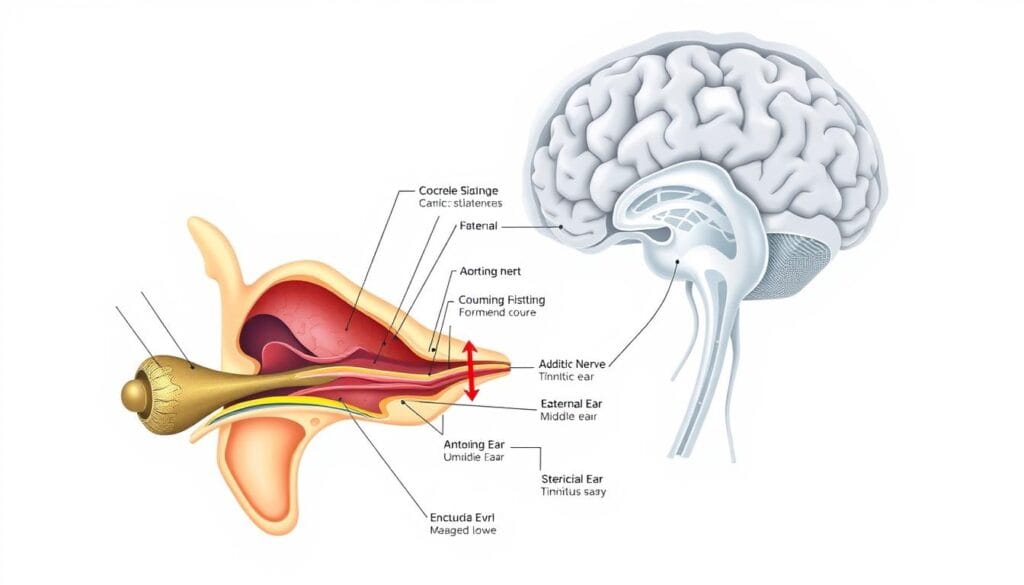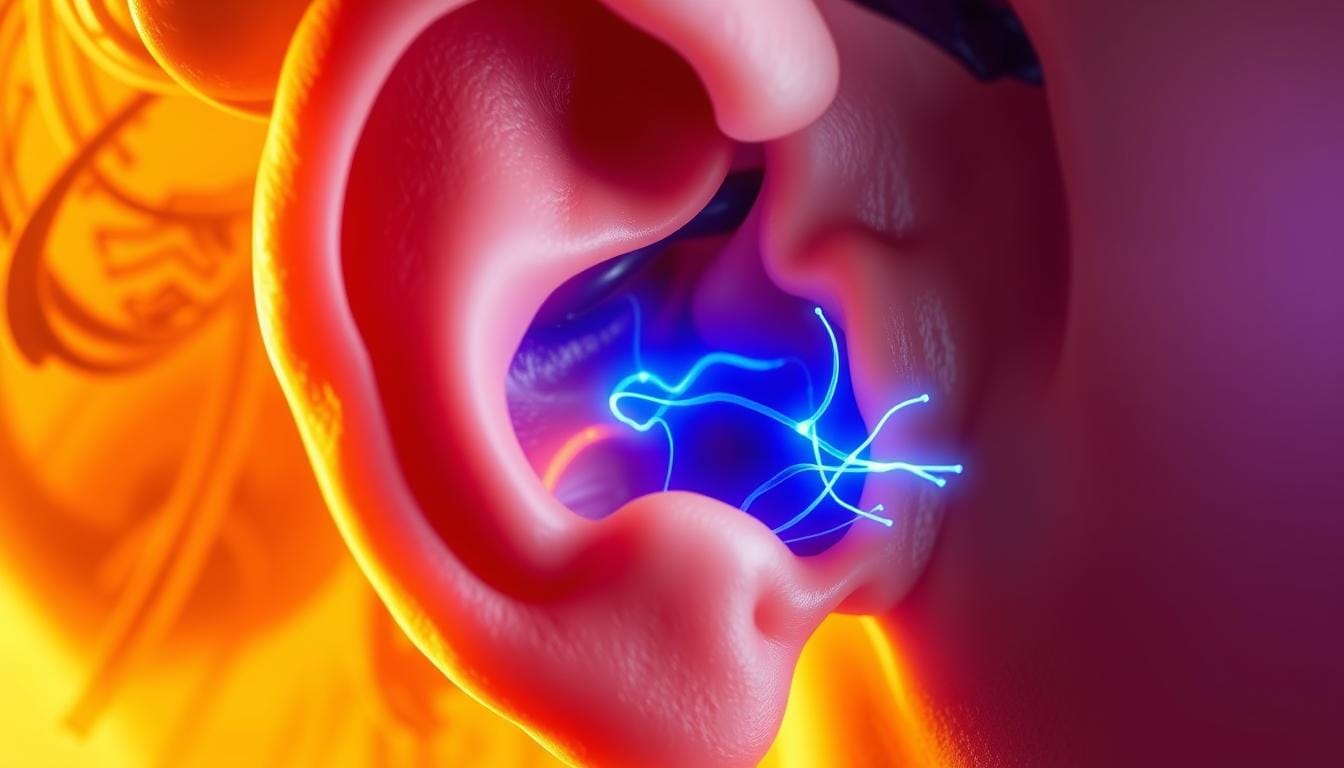Ringing in the Ears: Causes and Effective Treatments
Do you hear a ringing or buzzing sound in your ears without any reason? You’re not alone. This condition, called tinnitus, bothers millions of people around the world. It can make everyday life hard.
Tinnitus is more than just a bother; it might show there’s something wrong that needs fixing. Knowing the causes and treatments is key to handling it well.
Key Takeaways
- Tinnitus is a common condition characterized by ringing or buzzing sounds in the ears.
- It can be a symptom of an underlying health issue.
- Various treatment options are available to manage tinnitus.
- Understanding the causes is key to effective management.
- Tinnitus treatment may involve addressing the underlying cause.
What That Persistent Ringing Means for Your Health
The constant ringing or buzzing in your ears might be more than annoying. It could be a sign of a health problem. Tinnitus, the medical term for this, can show up in different ways and affect your health in various ways.
Types of Tinnitus Sounds You Might Experience
Tinnitus can sound like ringing, buzzing, hissing, or roaring. The sound’s type and volume can differ greatly from person to person. This makes each person’s experience unique.
Subjective vs. Objective Tinnitus
Subjective tinnitus is the most common, where only you can hear it. On the other hand, objective tinnitus is rare and can be heard by a doctor during an exam. Knowing the type of tinnitus you have is key to finding the right treatment.
How Common is Tinnitus in the United States?
Tinnitus affects millions in the U.S., especially as people get older. It’s believed that nearly 1 in 5 Americans experience tinnitus at some point.
Risk Factors That Increase Your Chances
Several factors can raise your risk of getting tinnitus. These include loud noises, age-related hearing loss, and certain health conditions. Managing these risks is crucial for managing tinnitus symptoms well.
Knowing the causes and risks of tinnitus is the first step to dealing with it. By understanding what might be causing it, you can take steps to lessen its impact on your life.
Common Causes of Ringing in the Ears
The feeling of ringing in your ears, known as tinnitus, can come from many sources. Knowing what causes it is key to managing it well.
Age-Related Hearing Loss
As you get older, your inner ear’s nerve endings can wear out. This leads to hearing loss and sometimes tinnitus. Presbycusis often hits high-frequency hearing first, making tinnitus a big worry for seniors.
Exposure to Loud Noises
Loud noises can also cause tinnitus. This includes sudden, very loud sounds or long-term exposure to loud music or machinery.
Immediate vs. Cumulative Damage
Loud noises can hurt your hearing right away, causing tinnitus. Long-term exposure to loud sounds can also lead to tinnitus. Wearing ear protection in loud places is very important to avoid damage.
| Loud Noise Exposure | Potential Outcome |
|---|---|
| One-time exposure to very loud noise | Immediate hearing damage and tinnitus |
| Prolonged exposure to loud sounds | Cumulative hearing damage and tinnitus |
Earwax Blockage
Earwax buildup can block your ear canal, causing tinnitus and other issues. Clearing the blockage can often fix tinnitus symptoms.
“Earwax blockage is a common and often easily treatable cause of tinnitus. Having a healthcare professional remove the blockage can provide relief.”
Ear and Sinus Infections
Ear or sinus infections can also cause tinnitus. These infections can mess with the Eustachian tube, leading to tinnitus. Treating the infection is crucial for managing tinnitus.
Knowing why you have tinnitus is the first step to finding relief. Whether it’s due to age, loud noises, earwax, or infections, finding the cause helps you find the right treatment.
Medical Conditions That May Trigger Tinnitus
Some medical conditions can cause or make tinnitus worse. Tinnitus is not just about ringing in your ears. It can be a sign of many health problems.
Ménière’s Disease
Ménière’s disease affects the inner ear, causing balance and hearing issues. Tinnitus is a common symptom, along with vertigo and hearing loss. Treating Ménière’s can help with tinnitus.
TMJ Disorders
TMJ disorders can lead to tinnitus because of their close location to the ear. Problems like jaw pain, clicking, or locking can cause tinnitus. Fixing TMJ issues might lessen tinnitus.
Head or Neck Injuries
Head or neck injuries can lead to tinnitus. Damage to the auditory nerve or other hearing-related structures is possible. Getting the injury properly treated is key.
Acoustic Neuroma
An acoustic neuroma is a non-cancerous tumor on the nerve from the inner ear to the brain. It can cause tinnitus, hearing loss, and balance issues. Treatment depends on the tumor’s size and growth rate.
Other Rare Causes to Be Aware Of
Less common conditions that might cause tinnitus include otosclerosis and certain vascular problems. Knowing about these can help you get the right medical care.
Understanding these conditions and their connection to tinnitus is crucial. It helps in managing tinnitus symptoms better. By treating the root cause, you might find relief from tinnitus.
Medications That Can Cause Ear Ringing
Some common medicines can cause or make tinnitus worse. These drugs are meant to help with health issues but can lead to ringing in the ears.
Antibiotics and Tinnitus
Some antibiotics, like gentamicin, can cause tinnitus. This risk is higher with long-term use or high doses. If you’re on antibiotics and notice tinnitus, talk to your doctor right away.
Aspirin and NSAIDs
Too much aspirin or NSAIDs can lead to tinnitus. Cutting down or stopping these drugs might help. But always check with your doctor before making any changes.

Cancer Medications
Chemotherapy drugs can also cause tinnitus. It’s not clear how, but they might harm the inner ear.
Diuretics and Blood Pressure Medications
Some diuretics and blood pressure meds can cause tinnitus. This effect is usually short-lived but can last longer in some cases.
It’s crucial to talk to your healthcare provider if you have tinnitus. They can figure out if a medicine is the cause and find other options if needed.
The Stress and Tinnitus Connection: A Vicious Cycle
Tinnitus and stress are closely linked, making it hard to break the cycle. Tinnitus can cause constant ringing or sounds, leading to stress. Stress can also make tinnitus seem worse, creating a vicious cycle.
How Stress Amplifies Tinnitus Symptoms
Stress can make tinnitus sounds seem louder or more bothersome. This is because stress triggers the body’s ‘fight or flight’ response.
The Autonomic Nervous System’s Role
The autonomic nervous system is key in how stress affects tinnitus. Stress can increase heart rate, blood pressure, and muscle tension. These changes can make tinnitus symptoms worse.
| Stress Factor | Impact on Tinnitus |
|---|---|
| Increased Heart Rate | Makes tinnitus more noticeable |
| Muscle Tension | Can increase the perceived loudness of tinnitus |
| Anxiety and Stress | Heightens awareness and distress related to tinnitus |
The Psychological Impact of Chronic Ear Ringing
Chronic tinnitus can cause significant psychological distress. This includes anxiety and depression. The constant ringing can be frustrating and demoralizing, affecting your quality of life.
“Tinnitus is not just a condition; it’s a life-altering experience that affects not just the ears but the entire being.”
Breaking the Stress-Tinnitus Cycle
To break this cycle, a multifaceted approach is needed. Relaxation techniques like mindfulness meditation and deep breathing can help reduce stress. Cognitive Behavioral Therapy (CBT) is also effective in managing tinnitus’s psychological impact.
Understanding the connection between stress and tinnitus is key. By managing both, you can improve your quality of life despite this challenging condition.
When to See a Doctor About Your Tinnitus
Knowing when to see a doctor about your tinnitus is key to getting better. If you have persistent ringing in your ears, look out for signs that mean you need to see a doctor.
Warning Signs That Require Immediate Attention
Certain symptoms with tinnitus mean you should see a doctor right away. These include:
- Severe dizziness or vertigo
- Hearing loss
- Ear pain or discomfort
- Discharge or bleeding from the ear
What to Expect During Your Appointment
Your doctor will do a detailed check-up. They will look at your medical history and examine your ears. They might also ask about your tinnitus, like when it started and how it affects you.
Tests Your Doctor May Recommend
Your doctor might suggest tests to find out why you have tinnitus. These can include:
| Test | Purpose |
|---|---|
| Hearing test (audiogram) | Assess hearing loss |
| Imaging tests (MRI or CT scan) | Examine the ear and brain structure |
| Balance tests | Evaluate vestibular function |

It’s important to know when to get medical help for tinnitus. By spotting warning signs and understanding your doctor’s visit, you can start treating your condition.
Ringing in the Ears Causes and Treatment: Medical Approaches
The medical world has come up with many ways to tackle tinnitus. When looking at tinnitus treatment options, it’s key to check out the different medical methods for managing tinnitus symptoms.
Hearing Aids and Masking Devices
Using hearing aids and masking devices is a good way to manage tinnitus symptoms. These tools can make hearing better or cover up the ringing sound.
Tinnitus Retraining Therapy (TRT)
Tinnitus Retraining Therapy (TRT) is a chronic tinnitus solution. It mixes counseling with sound therapy to help the brain get used to the tinnitus sounds.
Cognitive Behavioral Therapy (CBT)
Cognitive Behavioral Therapy (CBT) is a psychological method. It helps people see tinnitus differently, making it less of a problem in their lives.
Medications to Manage Symptoms
There’s no cure for tinnitus, but some drugs can help with symptoms like anxiety or depression.
Emerging Medical Treatments
Research is always going on for tinnitus treatment options. New treatments like drugs and sound therapies are being explored.
As we learn more about tinnitus, so do the chronic tinnitus solutions. It’s important for people to talk to doctors to find the right treatment for them.
“Tinnitus is a complex condition that requires a multifaceted treatment approach.” – Dr. [Last Name], Tinnitus Specialist
Sound Therapy for Tinnitus Relief
Sound therapy is a promising way to help those with tinnitus. It uses certain sounds to manage tinnitus symptoms. This makes it a valuable tool for those looking to ease their condition.
White Noise Machines
White noise machines are a common choice for tinnitus management. They create a steady sound that can cover up the ringing or buzzing of tinnitus. White noise is especially helpful in quiet places where tinnitus is more noticeable.
Nature Sounds and Music Therapy
Nature sounds like rain or ocean waves, and music therapy are also options. These sounds can be calming and lessen the feeling of tinnitus. Music therapy can be customized to fit an individual’s tastes, making it a personal way to find relief.
Notched Music Therapy
Notched music therapy is a more specific sound therapy. It involves listening to music that has the tinnitus frequency removed. This helps the brain get used to the tinnitus sound over time.
Apps and Digital Solutions for Tinnitus Management
Many apps and digital tools offer sound therapy for tinnitus. They range from simple white noise generators to more advanced programs designed to manage tinnitus symptoms.
Creating Your Personal Sound Environment
Creating a personal sound environment can be an effective way to manage tinnitus. This means choosing sounds that are comforting or distracting to you. Using these sounds can help lessen your tinnitus symptoms.
| Sound Therapy Option | Description | Benefits |
|---|---|---|
| White Noise Machines | Produces consistent, even sound | Masks tinnitus symptoms |
| Nature Sounds and Music Therapy | Calming sounds and personalized music | Reduces tinnitus perception |
| Notched Music Therapy | Music filtered to remove tinnitus frequency | Helps brain habituate to tinnitus |
Dietary Changes That May Improve Tinnitus Symptoms
Certain foods and drinks can make tinnitus worse. Others might help. Choosing the right foods is key to managing tinnitus.
Foods to Avoid with Tinnitus
Some foods can make tinnitus symptoms worse. These include:
- High-sodium foods that can lead to fluid retention and increased blood pressure
- Processed meats containing preservatives like MSG
- Foods high in sugar that can cause inflammation
Reducing or avoiding these foods might help ease tinnitus symptoms.
Beneficial Foods for Ear Health
Some foods can support ear health and possibly reduce tinnitus. These include:
- Zinc-rich foods like oysters, beef, and chicken
- Antioxidant-rich foods such as berries and leafy greens
- Omega-3 fatty acids found in salmon and walnuts
These foods can improve ear health and may help with tinnitus relief.
The Impact of Caffeine and Alcohol
Caffeine and alcohol can affect tinnitus symptoms. While reactions vary, some people find that:
- Caffeine can increase heart rate and worsen tinnitus
- Alcohol can alter blood flow and potentially exacerbate symptoms
Limiting or avoiding these substances may help manage tinnitus.
Supplements That May Help
Some supplements may help with tinnitus symptoms. These include:
- Ginkgo biloba
- Zinc supplements
- Magnesium
But, always talk to a healthcare professional before taking any supplements.
Sample Meal Plan for Tinnitus Sufferers
| Meal | Foods |
|---|---|
| Breakfast | Oatmeal with berries and walnuts |
| Lunch | Grilled chicken salad with leafy greens and citrus vinaigrette |
| Dinner | Baked salmon with roasted vegetables |
This meal plan includes foods good for ear health. It’s a good start for managing tinnitus through diet.
Relaxation Techniques to Manage Ear Ringing
Managing tinnitus symptoms can be tough, but relaxation techniques can help a lot. Stress makes tinnitus worse, creating a cycle. By using relaxation, you can stop this cycle and lessen symptoms.
Mindfulness Meditation for Tinnitus
Mindfulness meditation is great for tinnitus. It helps you focus on now, often by watching your breath. This calm state can make tinnitus seem less bad.
5-Minute Meditation Exercise
For a 5-minute meditation, sit comfortably with eyes closed. Pay attention to your breath. If your mind strays, gently bring it back to your breath. Start with short times and get longer as you get better at it.
Progressive Muscle Relaxation
Progressive muscle relaxation is about tensing and relaxing muscles. It lowers tension and relaxes you. Start with your toes and go up to your head, holding each for a few seconds before letting go.
Deep Breathing Exercises
Deep breathing calms your mind and body. Slow, deep breaths can reduce stress and help tinnitus. Try inhaling for four, holding for seven, and exhaling for eight.
Yoga Poses That May Help
Some yoga poses can relax and reduce stress. Downward-facing dog, child’s pose, and seated forward bend calm your system. Yoga might also help with tinnitus symptoms.
Conclusion: Living Well Despite Tinnitus
Managing tinnitus symptoms needs a full approach. This includes medical treatments, lifestyle changes, and relaxation techniques. By understanding what causes your ringing ears, you can find ways to live better.
Sound therapy, changing your diet, and managing stress can help a lot. Adding these to your daily life can make tinnitus easier to handle. This way, tinnitus won’t disrupt your day as much.
It’s important to take charge of your tinnitus. Work with your doctor and make smart choices about your treatment. This will help you create a plan that works for you.
With the right steps and support, you can still live well with tinnitus. Stay informed and proactive. This way, you can keep your life full and enjoyable, even with tinnitus.
